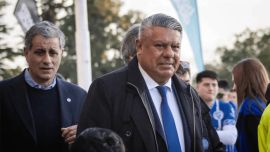In 1993, at the age of 27, Horacio Rodríguez Larreta founded the Grupo Sophia, the foundation on which he anchored his political career. Today, 30 years later, the outgoing Buenos Aires City mayor is again putting together a think tank to restore him to political life after this year’s political defeat.
The Grupo Sophia foundation was laid to rest in 2021 after over 15 years of inactivity so Rodríguez Larreta will have to seek a new framework to start work after he leaves office as from December 10.
His entourage likewise believes in the mayor’s possibilities of assembling a new political party. That thesis is backed by his loss of leadership within PRO, along with the implosion of the opposition Juntos por el Cambio coalition after Mauricio Macri’s decision to support Javier Milei’s candidacy. In this scenario, Rodríguez Larreta will be left in no man’s land after passing City Hall to Jorge Macri and without any leadership within PRO whose most important leaders like Macri, party chair Patricia Bullrich, Cristian Ritondo or Diego Santilli are working to help Milei so that starting from scratch is almost his only way ahead.
For now the name of the new foundation is being kept secret.
Fragmentation
Just as Rodríguez Larreta is becoming self-employed, the crisis facing Juntos por el Cambio and the fact that almost all the provincial elections were scheduled ahead of the national voting has increasingly led to governors taking refuge in their districts. Most are strengthening their local power structure in order to emerge in a stronger position for dialogue with the next president.
One example of such movements is the plan of Chubut Province governor-elect Ignacio Torres, who seeks to register his own party at the provincial level, thus emulating the strategy of the late Mario Das Neves, who created Chubut Somos Todos, his own brand which might or might not include Peronism.
Torres is thinking of creating a party called Despierta Chubut (“Wake Up Chubut”), in reference to his campaign slogan, according to the the ADNSur news portal.
The governor-elect is thus unhitching himself from the Juntos por el Cambio label to boost a provincial construction like in neighbouring Río Negro and Neuquén. The former will be governed by Alberto Weretilneck with his own party Juntos Somos Río Negro, created in 2015, while the latter has the Movimiento Popular Neuquino, created in 1961 and governing the province from 1963 through to this year with some intervals for military rule.
Further south down the map is Santa Cruz, the homeland of the Kirchners, which next month will have a new governor disconnected from Kirchnerism, oil workers trade unionist Claudio Vidal, who also has his own party called SER (Somos Energía para Renovar).
This political fragmentation is extended nationwide with the traditional parties no longer dominant. Misiones has been governed for two decades by the Frente Renovador de la Concordia, headed by Carlos Rovira. In Salta, Gustavo Sáenz was re-elected on the Partido Identidad Salteña ticket, which was allied with PRO in 2019 and competed against it this year. The advantages of autonomy.
In San Luis, Claudio Poggi – who brought the dynasty of the Rodríguez Saa brothers to an end – triumphed via the alliance of his party Avanzar San Luis with a Juntos Por el Cambio which has lost its way nationwide. A similar situation for Marcelo Orrego of San Juan who reached power via an alliance of the party he heads, Producción y Trabajo, with Juntos.
Today everything is under discussion.
Numbers
Radicalism will have a tribe of five governors as from December 10: Alfredo Cornejo (Mendoza); Carlos Sadir (Jujuy); Maximiliano Pullaro (Santa Fe); Gustavo Valdés (Corrientes) and Leandro Zdero (Chaco).
Peronism will have only six provinces with notable differences between them. The Buenos Aires Province of Axel Kicillof will not be the same thing as the Catamarca of Raúl Jalil, the Tucumán of Osvaldo Jaldo, the Formosa of Gildo Insfrán, the La Pampa of Sergio Ziliotto and the La Rioja of Ricardo Quintela (all of them except Jaldo, who was acting governor, were re-elected).
And what will happen in Córdoba, the mirror into which everybody stares? A provincial force with capacity for negotiation in Congress and good dialogue with both Peronism and the opposition.
In the last elections, outgoing Governor Juan Schiaretti competed with his own alliance named Hacemos Por Nuestro País, which functioned as a national version of his provincial alliance Hacemos Por Córdoba. At local level Schiaretti has the Peronist Partido Justicialista, incorporated into his structure but not at national level because the Córdoba voter dislikes Buenos Aires Peronists. Historic questions.
To sum up, the next president will negotiate with greater intensity, governor for governor, every bill in Congress because allies will be needed even to reach quorum. This could lead to politics becoming more provincial, with the releasing of funds for local public works the most effective way of unblocking the negotiation of a package of laws. Conducive to effectiveness, as Hipólito Yrigoyen might have said.



















Comments